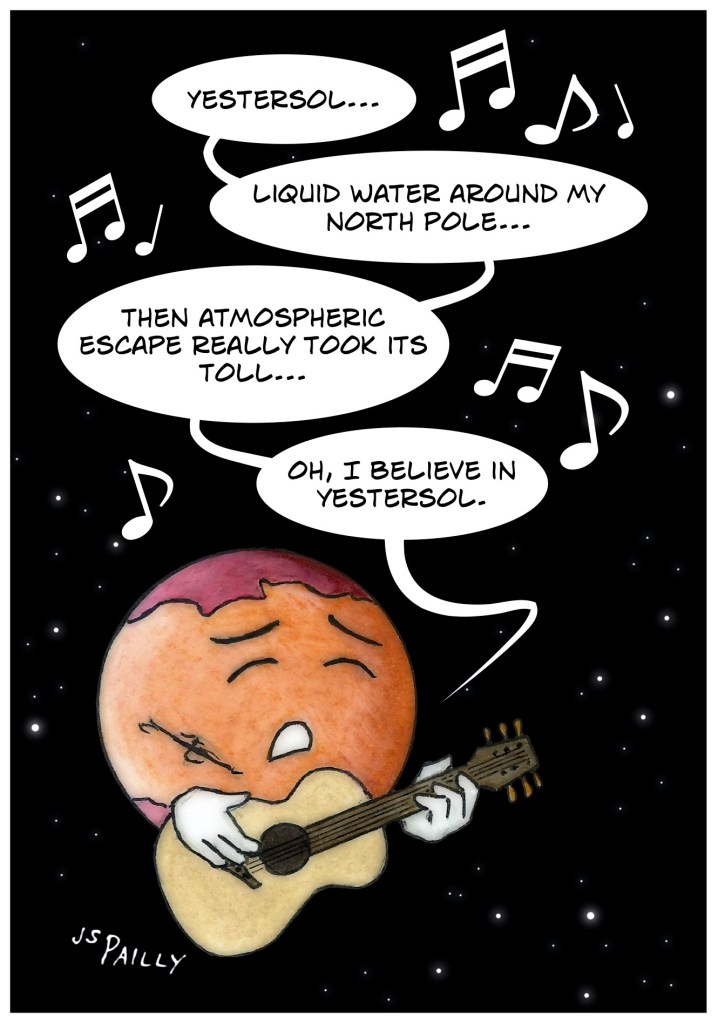Hello, friends! Welcome to Our Place in Space: A to Z! For this year’s A to Z Challenge, I’ll be taking you on a partly imaginative and highly optimistic tour of humanity’s future in outer space. If you don’t know what the A to Z Challenge is, click here to learn more. In today’s post, Y is for…
YESTERSOL
Do you ever feel like there just isn’t enough time in your day? Like you just cannot get everything you need to do in a day done in a day? Do you wish your day could be just a little bit longer? If so, moving to Mars might be a good solution for you! A day on Mars is nearly 40 minutes longer than a day on Earth! Scientists call this slightly longer Martian day a “sol,” and several cute and clever new words have been introduced related to Martian timekeeping: words like yestersol, tosol, and solorrow.
As of yet, there are no humans on Mars (citation needed), but there are humans here on Earth who have to live and work and plan their whole schedules according to Mars time. You see, the Mars rovers can only operate during Martian daylight hours. Therefore, everyone back at mission control for those rovers needs to be awake, alert, at their desks and ready to go when it’s daytime on Mars (regardless of what time it is here on Earth).
Sometimes the discrepancy between a Martian sol and an Earthly day isn’t so bad. Sometimes, when it’s daytime at Jezero Crater (current location of the Perseverance rover), it’s also daytime in southern California (where Perseverance mission control is headquartered). But day after day, sol after sol, that forty minute difference adds up. At some point, high noon at Jezero crater will be the middle of the night in southern California.
It’s important that the same crew of people always works with the same rover. Therefore, NASA has had special clocks and watches made to help people keep track of what time it is on Mars. NASA scientists and engineers associated with various Mars missions set their work schedules, meal schedules, and sleep schedules according to Mars time. As a result, there is a small community of “Martians” here on Earth, living their lives about forty minutes out of sync from the rest of us. And quite naturally, certain colloquial terms have developed within this little community of Mars researchers.
Yestersol refers to the sol before the current sol. Tosol is the current sol. And solorrow is the next sol, after the current sol. Making a clear distinction between “yesterday” and “yestersol” is especially important for people who live on Earth and still have to deal with many Earthly concerns, but who also, in a very real way, need to think and act as if they’re living on Mars.
I like to think of the whole “yestersol, tosol, solorrow” phenomenon as a little preview of the future. It’s one thing to think about big picture futuristic stuff, like space elevators and planetary protection laws; but it’s little bits of culture and daily life (sorry, sol-ly life) that help make the future feel like a real place.
Want to Learn More?
NASA spacecraft engineer Nagin Cox gave a really neat TED Talk about what it’s like living on Mars time. Click here to watch it.


“citation needed” lol… at least, I think it’s lol
LikeLiked by 2 people
If there’s one thing I’ve learned researching this Our Place in Space series, it’s that a bunch of stuff has already happened without me knowing about it.
LikeLiked by 1 person
I do love those names – and your drawing is especially fab.
Working that way must eventually play havoc with their circadian rhythms. Wonderful what people will do in the name of science.
Debs visiting this year from
Making Yourself Relationship Ready
LikeLiked by 1 person
I kind of want to try it myself, just for a little while. But doing it for months on end like the rover crews do sounds kind of miserable.
LikeLiked by 1 person
Quite informative..which i could work on martian clock and get 40 more min to read posts peacefully 🙂 . So many unique things I learnt on ur blog…and that cartoon with rock song is fantastic and cute 😊…reminds me when scientists jam in a series called big bangtheory….
Dropping by from a to z “The Pensive”
LikeLiked by 1 person
Wish not which * damn the typos on phone!
LikeLiked by 1 person
Oh gosh, an extra 40 minutes a day to read A to Z posts would be fantastic! I fell behind on that early this month, and I’ve never quite been able to catch up. An extra 40 minutes would be perfect.
A lot of scientists and engineers I’ve met over the years are also musicians. There’s definitely a connection there. Something about the mathematics of science and the rhythms of music must naturally compliment each other.
LikeLike
I love the comic and the Beatles cover. As someone whose circadian rhythms have always been messed up, I feel like I would be a natural for a NASA Mars Rover positions (apart from not knowing all that sciency and engineering stuff).
LikeLiked by 1 person
I kind of want to try it, just for a little while. I feel like it would be a neat experience.
LikeLiked by 1 person
Rather fascinating people are living Mars time here!
LikeLiked by 1 person
The TED Talk is really interesting. The people who do this came up with their own lingo surprisingly quickly.
LikeLike
Your opening reminded me of the Blade Runner off-world colonies pitch. “A new life awaits you in the off-world colonies, a chance to begin again in a golden land of 40 extra minutes a day!”
LikeLiked by 2 people
Nice! I wasn’t thinking of that specifically, but I did feel a little extra Sci-Fi while I was writing that part.
LikeLiked by 1 person
Wonderful work on the comic BTW 🙂 I really enjoyed this post!
LikeLiked by 1 person
Thanks! I had that drawing done a while ago, actually, and I’ve been really eager to get to Y so I could finally post it.
LikeLike
Sigh, that must be so difficult for the ‘Martians’ – humans on earth to keep adjusting their schedules to Mars time. The things professions entail, wow. But then the excitement of being one of the rare few to work on such projects. Always a trade off.
LikeLiked by 1 person
I think it probably helps that they’re doing it together, as a team. I think it would be a little extra miserable to be doing it all alone.
LikeLike